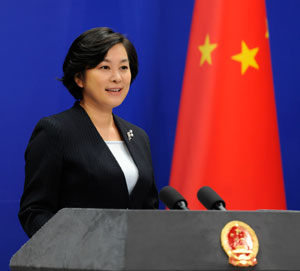NEW DELHI, Dc 10: Amidst continued stand-off between the Indian forces and the People’s Liberation Army in eastern Ladakh, China on Thursday squarely blamed New Delhi for the impasse stating “the responsibility totally lies with the Indian side for the situation along the Line of Actual Control (LAC)”
Responding to external affairs minister S Jaishankar’s statement that China had violated border agreements by deploying a large number of soldiers along the border, the Chinese foreign spokesperson Hua Chunying said China “has been strictly observing the agreements” and that Common efforts were needed to maintain good relations between China and India.
Speaking at a virtual session with the Sydney-based Lowy Institute on Wednesday, Jaishankar had said China had given India “five different explanations” for its unprecedented deployment of forces on the LAC this summer, “We are today probably at the most difficult phase of our relationship with China, certainly in the last 30 to 40 years or you could argue even more,” he had said. He added that “the relationship this year has been very significantly damaged” by China violating border agreements under which both sides would not deploy large number of forces along the LAC.
“Now for some reason, for which the Chinese have to date given us five differing explanations why the Chinese have violated it,” he said. “The Chinese have literally brought tens of thousands of soldiers in full military preparation mode right to the LAC in Ladakh. Naturally the relationship would be profoundly disturbed by this.”
In Beijing, Foreign Ministry spokesperson Hua Chunying, responding to a question about his statement, said “the merits of the situation” were “very clear”.
“China and India are neighbours and the world’s two biggest emerging markets and keeping good relations serves the fundamental interests of both countries and its people but it requires common efforts from both sides,” Hua said.
What began as a military faceoff along the disputed LAC early May has triggered economic and cultural discord between the two neighbours with New Delhi and Beijing grappling for ways to resolve the deadlock.
But Blaming India for the stand-off, the Chinese foreign ministry spokesperson said, “The merits of the situation at the border area are very clear and the responsibility totally lies with the Indian side. China has been strictly observing the agreements signed between the two sides and committed to resolving the border issue through dialogue and we are committed to safeguarding regional peace and tranquility at border areas… But like all sovereign states we are determined in safeguarding our territorial integrity. So on the Indian side, I think this is a serious question on what it should reflect upon.”
Jaishankar had also made clear that it was impossible for the relationship to continue as normal given the situation on the LAC.
“We are very clear that maintaining peace and tranquility along the LAC is the basis for the rest of the relationship to progress,” he said. “You can’t have the kind of situation you have on the border and say let’s carry on with life in all other sectors of activity. It’s just unrealistic.”
The Chinese side, however, has in recent statements sought to de-link the border situation from other aspects of the relationship such as economic ties and called for India to put the boundary dispute in a “proper” position — a view that India has said is untenable as peace on the border was a prerequisite for the relationship.
China also so far hasn’t signalled any willingness to return to the status quo prior to May’s multiple transgressions by the PLA. Both sides have held eight rounds of talks at the Corps Commander level, the last of which was held on November 6, but are yet to agree on a plan to disengage.
Hua repeated that view on putting the border tensions in a “proper” position on Thursday, saying “We hope India can work with us and contribute to solidarity, cooperation and common development.”
“There are challenges in bilateral relations but China’s position and policy on India hasn’t changed,” she said. “As two major countries and emerging markets, keeping good relations serve the fundamental interests of both and we will stay committed to safeguarding the peace and tranquility in the border area. On the historical issues, China believes that we should find fair, reasonable and mutually acceptable solutions based on equal-footed consultation and put it on the proper position in our bilateral relations. We hope we can reach consensus, properly manage differences, enhance practical cooperation and bring our bilateral relations back on the right track,” she said.
Indian External affairs ministry spokesperson Anurag Srivastava had earlier spelt out the Indian government’s position on the disengagement process, saying the LAC “must be strictly respected and observed as this is the basis for peace and tranquility in the border areas”
The Chinese spokesperson instead tried to portray her country as a “victim of aggression” from India and said it would protect its territory.
She, however, gave no definitive answer to the question when the next rounds of talks between the two countries would be held or what was causing the delay. “China and India have been in communication through diplomatic and military channels on the border issue and we are working for further de-escalation of the border situation,” Hua added.
“Based on the implementation of the current consensus, we will have consultations to determine specific arrangements for further talks,” Hua said without giving any indications when future talks will be held.

